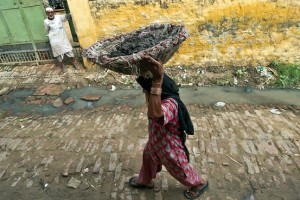‘Untouchables’ Still Pressed to Work Disposing Human Waste
 Indians from communities viewed as “untouchable” are often coerced into working as toilet cleaners who scrape feces out of primitive dry latrines by hand or collect waste from fields where villagers relieve themselves, according to a report published Monday by U.S. human-rights group Human Rights Watch.
Indians from communities viewed as “untouchable” are often coerced into working as toilet cleaners who scrape feces out of primitive dry latrines by hand or collect waste from fields where villagers relieve themselves, according to a report published Monday by U.S. human-rights group Human Rights Watch.
Hiring people for the practice dubbed “manual scavenging” has been illegal in India for decades. But it persists, especially in regions of the country where traditional caste hierarchies are rigid and communities lack indoor plumbing.
Manual scavengers are usually from the lowest rungs of the Hindu caste system (Indian Muslim communities have similar low-status members who perform this job) and women, the report said. These people often have no other employment option and inherit the job either through birth or by marriage.
In the 93-page report titled “Cleaning Human Waste: ‘Manual Scavenging,’ Caste and Discrimination in India,” Human Rights Watch said both women and men from the Valmiki community, for example, even work for the state, through local governments to collect night soil, a euphemism for human excrement.
Over the last nine months, the rights-monitoring group interviewed more than 135 people–including manual scavengers as well as activists and government officials–in the states of Gujarat, Madhya Pradesh, Maharashtra, Rajasthan, and Uttar Pradesh.
Some of those interviewed said they faced threats of violence from members of higher castes if they refused to carry out the degrading work, the report said. For example, some women in the states of Uttar Pradesh and Madhya Pradesh said they would sometimes be denied entry onto communal land to feed their livestock when they refused to clean toilets.
According to a 2011 census, there are still around 800,000 Indian households with dry latrines that have to be cleaned manually. Another government survey identified more than 11,000 manual scavengers in 12 states. Some activists say the number is much higher, particularly if you include those who do the work for the government.
The Human Rights Watch report said people who clean such toilets in villages are often not paid cash salaries but instead paid with leftover food, grain or used clothing. Most of them earn less than $4 a month, the report said.
“In areas where untouchability practices are intact, food is dropped into their hands or thrown in front of them,” as the manual scavengers’ upper-caste employers refuse to touch them, the report said.
The practice of manual scavenging is outlawed under India’s constitution. The Protection of Civil Rights Act, 1955, bans the practice of untouchability as well as compelling anyone from a lower caste to remove human waste from dry toilets.
In 1993, the Indian government passed a law that mandated the demolition of all dry toilets and banned the employment of manual scavengers. In 2012, the federal government allocated 980 million rupees [$16 million] to help people working as manual scavengers find other kinds of jobs.
Last year the Indian parliament passed another law prescribing stringent punishment, including imprisonment of up to five years, for forcing people to clean dry toilets. Enforcement of all the laws remains weak, Human Rights Watch said.
Lack of modern toilets is also a public health issue that has recently come to the forefront of political debate in India.
A World Health Organization report in May this year said that more than a half-billion Indian citizens still defecate in the open. Using fields, rivers and abandoned lots as toilets exposes people to diseases such as polio, hepatitis A and diarrhea. One in every 10 deaths in India, the World Bank said, is due to poor sanitation, a total of around 768,000 deaths a year.
India’s new Prime Minister, Narendra Modi, highlighted the importance of modernizing the country’s sanitation system during his election campaign earlier this year, saying that building toilets was more important than building temples.
In addition to the transformation of dry toilets to flush toilets, the manual scavengers need support – in the form of financial assistance, scholarships and housing – in seeking alternative livelihoods, the Human Rights Watch report said.
“The government needs to get serious about putting laws banning manual scavenging into practice and assisting the affected caste communities,” Meenakshi Ganguly, South Asia director of Human Rights Watch, said in a press statement Monday.
Source: The Wall Street Journal





